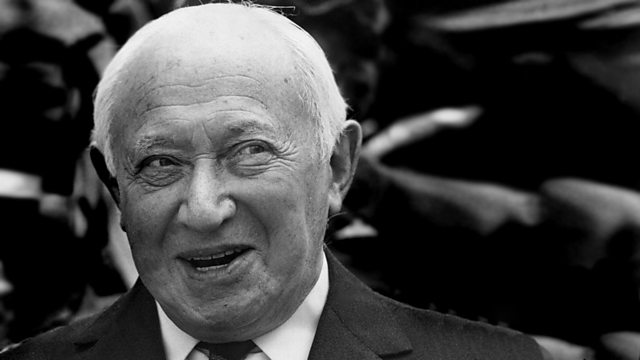Britain's role in making Israel's history

Israeli soldiers celebrate their capture of the Sinai in June 1967. British politicians opposed Israel retreating to its pre-war boundaries.
By Werner Rosenstock, AJR§ (Association of Jewish Refugees in Great Britain)
December 1967
The historical role of the Balfour Declaration and its impact on world Jewry during the Past fifty years were assessed in last month’s article by Robert Weltsch. In the meantime, the jubilee year of the Declaration was marked by many public and semi-public functions in this country and abroad. Fittingly, the first gathering, on October 22, was held in London under the auspices of the Board of Deputies, whose erstwhile vice-president, the second Lord Rothschild, was the addressee of the letter carrying the text of the Declaration.
The meeting was attended by the members of the Board as well as by representatives of 21 specially invited major Jewish organisations in this country, including the AJR. The main speakers were the veteran Labour leader, Mr. Emanuel Shinwell, M.P., and the Conservative M.P., Mr. John Biggs-Davison. The atmosphere of the meeting was, to a high extent, influenced by that morning’s announcement of the sinking of the Elath, and Mr. Shinwell especially was carried away by the emotions which this unexpected tragic event was bound to engender. It was an unforgettable experience to witness this widelyrespected national leader, whose main activities are outside the Jewish sphere, reaffirm bis Jewish affiliations and his feelings for Israel.
For listeners of Continental origin his speech was also remarkable as an example of non-partisan and independent thinking, which is much more widespreavd in the political life 0f this country than it was in Germany. Mr. Shinwell’s criticism of the Foreign Secretary *went so far that his Conservative colleague on the platform jokingly remarked in his address that he almost felt impelled to put in a good word for Mr. Brown.*

Emanuel (Manny) Shinwell in 1978.**
The meeting unanimously passed a Resolution expressing British Jewry’s pride in the fact that it was a British Government which was first among the Great Powers to declare its sympathy with Jewish Zionist aspirations. The Resolution also called upon the British and other Governments and men of good will everywhere “to help in ensuring the peace, security and continuing constructive development of the State of Israel.” The first public anniversary celebration in London was held under the auspices of the Zionist Federation on November 5 at the Theatre Royal, which was filled to capacity.
The most remarkable revelation of the function was the fact that a member of the British Cabinet, Mr. Richard Crossman, M.P.***, and the Israeli Foreign Minister, Mr. Abba Eban, expressed identical views on two crucial points arising from the present deadlock in the Middle East. A final settlement, they stated, can only be achieved by direct negotiations between Israel and the Arab States, and these “Negotiations must not be prejudiced by Israel’s retreat to its pre-war frontiers.” The past, including the attempt to substitute interim armistice lines for permanent frontiers and to replace diplomatic recognition by vengeful non-belligerency, is smashed beyond repair. Any attempt to return to it would be fraught with disaster,” said Mr. Crossman. Mr. Eban described the idea that Israel should move from the cease-fire lines without a peace settlement as “so irrational that it was amazing to hear it put forward at all.” He stressed that a peace structure in the Middle East had to grow from within and could not be imposed from outside.
While any attempts at an assessment of the present situation might be out-dated by the time this issue reaches readers, it may be worthwhile to evaluate some general changes in the Jewish scene which became evident in the course of recent events. Our minds go back to the times before 1933 when the existence of the Yishuv was also frequently in jeopardy. On such occasions the Jews in Germany, with the exception of a few “antiColonialist” pro-Arab Communists, were certainly in sympathy with their brethren in Palestine. Yet there was not this general feeling of personal involvement which manifested itself among all Jews in Western countries during this year’s emergency situation [i.e. the 6-day war].
This change of approach has many reasons. More often than not the Jews in Palestine under the Mandate were the objects rather than the active partners of the conflict, whereas now the Jews fought as defenders of a Sovereign State under their own flag. Among those Jews, who had found refuge in Western countries as victims of Nazi persecution, the feelings of personal engagement were intensified by the anxiety about their relatives and friends in Israel. On the other hand, the strong emotions among “indigenous” Jews in Western countries, most of whom have no family connections with Israel, are probably attributable to a spontaneous Jewishness which, as children and grandchildren of immigrants from Eastern Europe, they have preserved to a higher degree than the “assimilated ” German Jews.

The Israeli destroyer Eilat / Elath, sunk by a missile fired from and Egyptian boat also carrying Russian advisers. The ship began life as HMS Zealous and was sold by the Royal Navy to Israel in 1955.
A further difference from our pre-1933 situation in Germany arises from the pluralistic conception of the State in countries like Britain and the U.S.A., which makes it less difiicult for members of minority groups to foster their relations with their kin abroad. In fact, according to Crossman’s address at the anniversary celebration, the security of the Jewish position in Western countries has not been impaired but, on the contrary, decisively helped after the emergence of the State of Israel. Nevertheless, the question of “dual loyalties” still exists or may arise, though under different aspects than at the time of the Balfour Declaration. At that time, it was mainly a concern of the well-established members of the communities. Some of them genuinely felt that the spiritual values of Judaism might get lost if Jews entered the political arena and became a nation like any other nation. Others may have used the religious argument because they believed or wanted others to believe that they differed from their non-Jewish fellow-citizens only by their affiliation to a different denomination. Today, many former “anti-Zionists” are enthusiastic supporters of Israel.
However reservations may be met among Jews with political Left-wing leanings. This is not the place to go into the arguments of the alleged function of Israel as a “Western” outpost, and as readers will see in this issue, such views are anyhow not shared by the “Socialist International” which, at its conference in Zurich, expressed “full solidarity with the people of Israel”. However, just as nonJewish Left-wing politicians who are not wholeheartedly on Israel’s side are not antisemites, it would be an over-simplification if Jews of the same political leanings were branded as “red assimilationists “. Experience has shown that whilst most Jews in Western countries are anxious to support Israel, only few of them are willing to settle there. This may be disappointing for Israel and ultimately even impair the demographic composition of the country, as Premier Eshkol reiterated only recently. ****
Yet the callers for the “Ingathering of the Exiles” should also keep in mind that the disadvantages are partly outweighed by the political support which Jews in the Diaspora may render to Israel. Though in the unlikely case of a genuine conflict of interests they will side with their fellow citizens, in the ordinary course of political controversies ethnic and religious minorities are not only allowed but even expected to stand up for their people. There has been hardly a country in which the feelings of sympathy for Israel have been expressed so strongly by the general population as in Germany since the Middle East war. This has certainly contributed to a further decrease of tension felt by the Jews towards that country. As far as the attitude of those Jews who were forced to leave Germany under the Nazis is concerned, it appears that many of them are driven into two opposite extremes. Some feel irrevocably antagonistic because they were cast out by the country which they considered as their homeland. Others lay stress on the formative impact of their past lives in Germany and are prepared to strengthen the good will which exists in sections of post-war Germany. It is, therefore, no accident that, as happened recently, some former German Jews opposed the twinning of their Municipality with a German city, whereas others were in favour. The AJR has to respect both schools of thought and has advisedly refrained from giving guidance in matters of this kind. But a discussion among our readers about the problems involved would certainly be welcomed.

This is a photograph of Hungarian and Egyptian refugees at London’s Jews’ Temporary Shelter celebrating the festival of Passover in Spring 1956.
Notes and Links\
§ The AJR was established on 20 July 194 to support and represent the interests of the 70,000 Jewish Refugees from German-speaking countrieswho fled to Britain to escape Nazi oppression before the Second World War. This number includes approximately 10,000 children who fled Nazi-controlled Germany, Austria and Czechoslovakia to Britain on the Kindertransport between December 1938 and August 1939.
As well as the refugees who arrived prior to the outbreak of the Second World War, AJR membership today includes several groups of post-war Jewish refugees from Europe including survivors from concentration camps and ghettos, child survivors as well as those who survived in hiding.
*George Brown, Foreign Secretary at the time in Harold Wilson’s 1966-70 government
**Manny Shinwell was a left-wing Labour MP and chairman of the Parliamentary Labour Party 1964-67. He was one of the best-known Jews in British public life.
***Richard Crossman, Labour MP for Coventry. He was Lord President of the Council and Leader of the House of Commons at this time, though held ministerial office in Harold WIlson’s 1964-70 governments. He became a passionate Zionist after meeting Chaim Weizmann in 1946, though later recognised a terrible injustice had been done to the Palestinians. His book, Palestine Mission, is his account of his time as a member of the Anglo-American committee of inquiry into how Palestinian conditions would affect, be affected by, Jewish immigration and settlement.
I am quite clear after reading the documents that historically – but not legally, the Arab case is indisputable. We did include Palestine in the area of their independence: we failed to tell the French we had done so. We negotiated an entirely incompatible division of the spoils with France and Russia. And then, on top of all, we promised the Jews a national home.
From Crossman and the Creation of Israel, Warwick Modern Records Centre
****Levi Eshkol served as the third Prime Minister of Israel from 1963 until his death from a heart attack in 1969.
